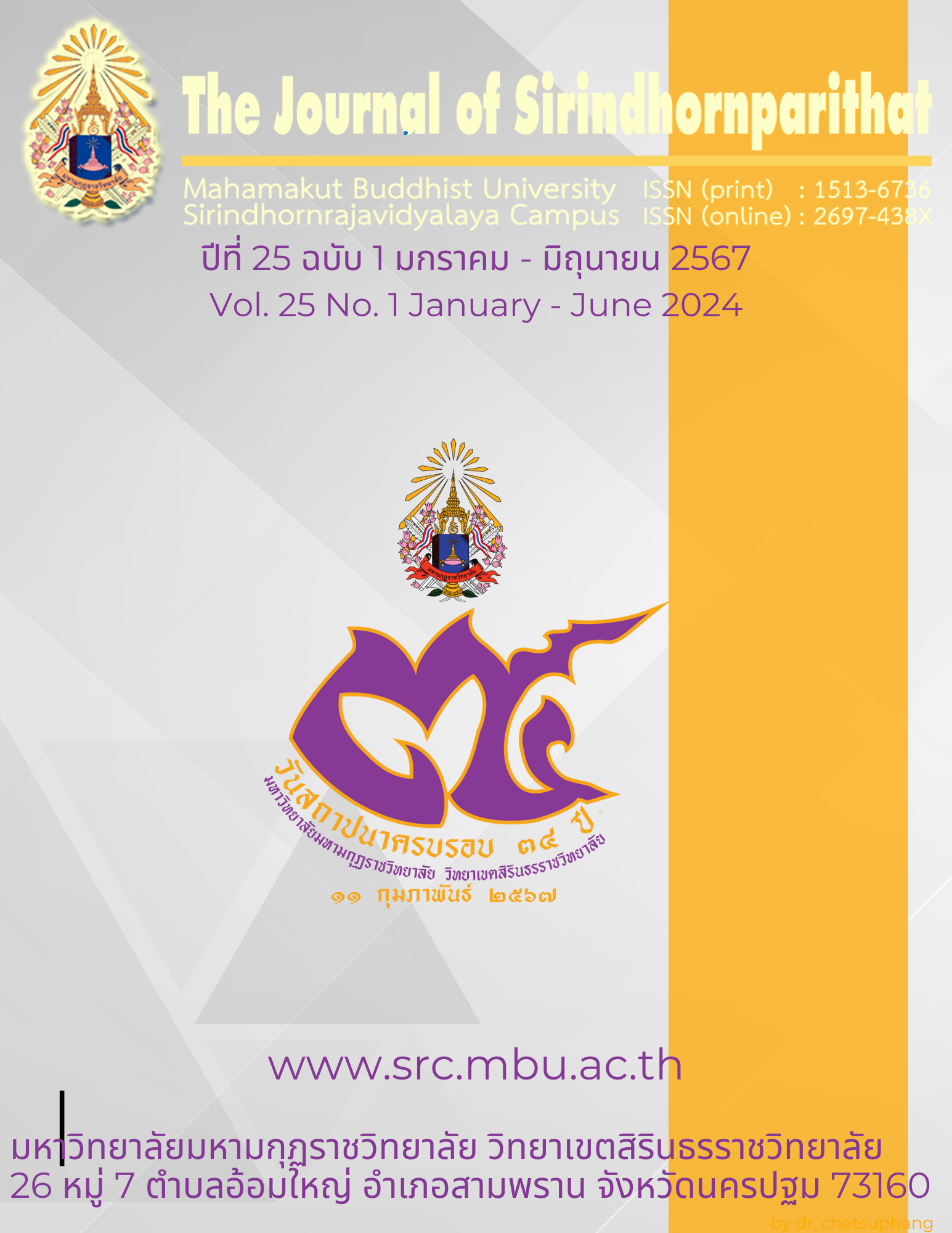Effective internal supervision process of school administrators Under the Office of Chonburi Primary Educational Service Area 3
Keywords:
Supervision process within educational institutions, School Administrators, effectivenessAbstract
The purposes of this research were to: 1) study the level of internal supervision process of school administrators effectively under the Office of Chonburi Primary Educational Service Area 3, and 2) present the internal supervision process of school administrators effectively under the Office of Chonburi Primary Educational Service Area 3. The sample group consisted of school administrators, Head of Academic Administration, and 280 teachers under the Office of Chonburi Primary Educational Service Area 3, obtained using the sample size estimation table of Krejcie & Morgan. Experts, including school administrators with at least 3 years of work experience and 5 scholars with knowledge and competency in internal supervision processes, were selected purposively. The research tools included a questionnaire with a reliability of 0.978 and an interview form. The statistics used in data analysis were frequency, percentage, mean, and standard deviation. For qualitative data, content analysis was employed. The results of the research revealed that 1) the level of the internal supervision process of school administrators that was effective under the Office of Chonburi Primary Educational Service Area 3 was found to have a mean and standard deviation at a high level overall. When considering each aspect, it was found that all aspects, including planning, supervision, supervision operations within educational institutions, assessment, and the study of the problem and the creation of media and supervision tools, were at a high level. 2) A study of the internal supervision process of school administrators under the Office of Chonburi Primary Educational Service Area 3 identified five aspects as follows: Supervision planning: Administrators, supervisors, and supervision recipients hold consultation meetings together on supervision planning to identify problems and needs requiring supervision, including planning supervision work procedures. Internal supervision operations in educational institutions: Supervision is implemented according to the activities specified in the supervision project within the educational institution. Educational institution administrators or supervisors must apply supervision principles, techniques, skills, media, activities, and supervision tools suitable for the context of the educational institution and personnel within it. Evaluation: Administrators involve all teachers in creating an agreement to determine the criteria for supervision assessment to establish guidelines for internal supervision and produce a clear instruction book. Supervision within the educational institution is conducted according to the established plan, with flexibility in supervision, and the results are communicated to the recipients individually. Study of the current situation: Educational institution administrators appoint working groups comprising representatives from all divisions to analyze the current state of the school, identifying strengths and weaknesses according to the appropriate context of the educational institution. Creation of media and supervision tools: Administrators hold meetings for all teachers to discuss problems and needs. Meetings are conducted to address the problems and needs of teachers in each class level, analyzing strengths and weaknesses and jointly setting guidelines and plans for supervision within educational institutions, considering OBEC policies and the context of educational institutions. Preliminary planning and layout of various tools may include the use of technology, such as conducting questionnaires among all teachers to gather feedback for analysis and appropriate format adjustment using the PDCA process to participate in supervision.
References
กรมวิชาการ กระทรวงศึกษาธิการ. (2552). หลักสูตรแกนกลางการศึกษาขั้นพื้นฐาน พุทธศักราช. 2551. กรุงเทพมหานคร : ชุมนุมสหกรณการเกษตรแหงประเทศไทย.
จุฬารักษ์ โคตรจักร. (2563). กระบวนการนิเทศการศึกษาในโรงเรียนภัทรญาณวิทยา สังกัดสำนักงานเขตพื้นที่การศึกษามัธยมศึกษา เขต 9. วิทยานิพนธปริญญาศึกษาศาสตรมหาบัณฑิต สาขาวิชาบริหารการศึกษา บัณฑิตวิทยาลัย มหาวิทยาลัยศิลปากร.
เฉลียว นัยนา. (2552). กระบวนการนิเทศภายในของสถานศึกษาขั้นพื้นฐานในอำเภอแม่สรวย สำนักงานเขตพื้นที่การศึกษาเชียงราย เขต 2. วิทยานิพนธ์ครุศาสตรมหาบัณฑิต สาขาวิชาการบริหารการศึกษา มหาวิทยาลัยราชภัฏเชียงราย.
พระราชบัญญัติการศึกษาแห่งชาติ. พ.ศ.2542 และที่แก้ไข. เพิ่มเติม (ฉบับที่ 3) พ.ศ. 2553. กรุงเทพมหานคร : สํานักนายกรัฐมนตรี. สํานักงานเลขาธิการสภาการศึกษา. กระทรวงศึกษาธิการ.
สายวินิตย์ ดวงสนาม. (2561). การนิเทศภายในสถานศึกษาของโรงเรียนขยายโอกาสทางการศึกษา สังกัดสำนักงานเขตพื้นที่การศึกษาประถมศึกษาสระบุรี เขต 2. วิทยานิพนธ์ปริญญาศึกษาศาสตรมหาบัณฑิต. มหาวิทยาลัยเทคโนโลยีราชมงคลธัญบุรี, คณะครุศาสตร์อุตสาหกรรม, สาขาวิชาการบริหารการศึกษา.
สํานักงานคณะกรรมการการศึกษาขั้นพื้นฐาน กระทรวงศึกษาธิการ. (2549). แนวปฏิบัติงานการจัด. การศึกษาของสถานศึกษานิติบุคคลในสังกัดเขตพื้นที่การศึกษา. สํานักงานคณะกรรมการ.
สำนักงานคณะกรรมการพัฒนาเศรษฐกิจและสังคมแห่งชาติ. (2559). สรุปสาระสำคัญแผนพัฒนาเศรษฐกิจและสังคมแห่งชาติ ฉบับที่สิบสอง พ.ศ. 2560-2564. กรุงเทพมหานคร : สำนักงานคณะกรรมการพพัฒนาเศรษฐกิจและสังคมแห่งชาติสำนักนายกรัฐมนตรี.
หน่วยศึกษานิเทศก์. (2562). แนวทางการนิเทศภายในโดยใช้ห้องเรียนเป็นฐานเพื่อพัฒนาคุณภาพผู้เรียน. กรุงเทพมหานคร: สำนักงานคณะกรรมการการศึกษาขั้นพื้นฐาน.
Cronbach, L.J. (1990). Essentials of psychological testing. (5th ed.). New York: Harper & Row. pp. 202-204
Krejcie, R.V., & D.W. Morgan. (1970). Determining Sample Size for Research Activities. Educational and Psychological Measurement. 30(3): 607 – 610

Downloads
Published
Issue
Section
License
Copyright (c) 2024 Mahamakut Buddhist University

This work is licensed under a Creative Commons Attribution-NonCommercial-NoDerivatives 4.0 International License.
บทความที่ได้รับการตีพิมพ์เป็นลิขสิทธิ์ของ มหาวิทยาลัยมหามกุฏราชวิทยาลัย วิทยาเขตสิรินธรราชวิทยาลัย
ข้อความที่ปรากฏในบทความแต่ละเรื่องในวารสารวิชาการเล่มนี้เป็นความคิดเห็นส่วนตัวของผู้เขียนแต่ละท่านไม่เกี่ยวข้องกับหาวิทยาลัยมหามกุฏราชวิทยาลัย วิทยาเขตสิรินธรราชวิทยาลัย และคณาจารย์ท่านอื่นๆในมหาวิทยาลัยฯ แต่อย่างใด ความรับผิดชอบองค์ประกอบทั้งหมดของบทความแต่ละเรื่องเป็นของผู้เขียนแต่ละท่าน หากมีความผิดพลาดใดๆ ผู้เขียนแต่ละท่านจะรับผิดชอบบทความของตนเองแต่ผู้เดียว



